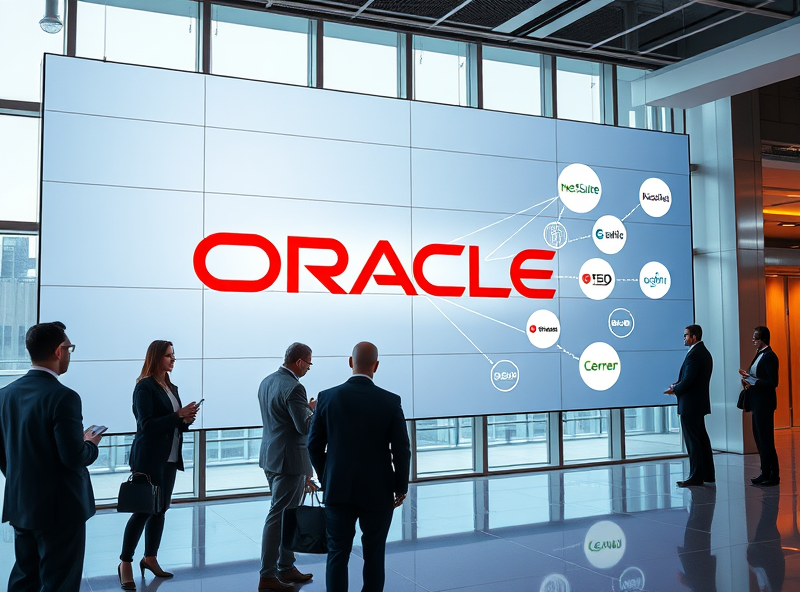
Oracle’s Cloud Transition and ERP Edge: How Oracle Competes in Enterprise Software
Rising Cloud Infrastructure: OCI Growth and Global Expansion

Oracle Cloud Infrastructure (OCI)는 최근 몇 년간 눈에 띄는 성장을 보이며 글로벌 클라우드 시장에서 입지를 강화하고 있습니다. 특히, Oracle은 기존의 데이터베이스 강점을 기반으로 고성능, 보안성, 비용 효율성을 갖춘 클라우드 서비스를 제공하면서 기업 고객들의 신뢰를 얻고 있어요.
OCI의 성장은 단순한 인프라 확장에 그치지 않습니다. Oracle은 2024년 기준으로 45개 이상의 클라우드 리전을 운영하고 있으며, 이는 Amazon Web Services(AWS), Microsoft Azure와 어깨를 나란히 할 정도로 글로벌 커버리지를 확대하고 있다는 의미입니다. 특히 유럽, 아시아, 중동 지역에 집중적인 투자를 통해 지역별 규제 준수와 데이터 주권 문제를 해결하고자 하는 전략이 돋보입니다.
또한, Oracle은 멀티클라우드 전략을 통해 Microsoft Azure와의 협업을 강화하고 있어요. 이로 인해 고객은 Azure와 OCI를 통합하여 워크로드를 유연하게 운영할 수 있으며, 이는 복잡한 엔터프라이즈 환경에서 큰 장점이 됩니다.
이러한 OCI의 성장은 Oracle의 ERP(Enterprise Resource Planning) 솔루션과도 밀접하게 연결되어 있습니다. Oracle Fusion Cloud ERP는 OCI 위에서 최적화되어 실행되며, 기업들이 클라우드 기반으로 전환할 때 핵심적인 역할을 하고 있어요. 특히 AI와 머신러닝 기능이 내장된 ERP는 실시간 분석과 자동화를 통해 기업의 의사결정을 더 빠르고 정확하게 만들어줍니다.
결과적으로, Oracle은 단순한 클라우드 제공업체를 넘어, 데이터 중심의 디지털 전환을 이끄는 전략적 파트너로 자리매김하고 있습니다. 기업 입장에서는 안정적이고 확장 가능한 인프라를 통해 비즈니스 민첩성을 높이고, 비용을 절감하며, 보안 수준을 강화할 수 있는 기회를 제공받는 셈이죠.
더 자세한 내용은 Oracle 공식 보도자료에서 확인하실 수 있어요: https://www.oracle.com/news/announcement/oracle-cloud-infrastructure-growth-2024-04-10/
ERP Market Leadership: Oracle Surpasses SAP in 2024

In 2024, Oracle officially surpassed SAP to become the global leader in the enterprise resource planning (ERP) software market. This milestone marks a significant shift in the competitive landscape of enterprise software, driven largely by Oracle’s aggressive cloud-first strategy and deep integration of AI across its Fusion Cloud ERP suite.
Oracle’s success can be attributed to its early and sustained investment in cloud infrastructure, particularly Oracle Cloud Infrastructure (OCI), which has enabled faster, more secure, and scalable ERP deployments. By focusing on industries like healthcare, finance, and manufacturing, Oracle has tailored its ERP solutions to meet highly specific regulatory and operational needs, giving it a competitive edge.
Another key differentiator is Oracle’s integration of generative AI and machine learning into its ERP platform. Features like predictive analytics, intelligent automation, and AI-powered financial close processes have resonated with CFOs and CIOs looking to modernize operations and reduce costs.
According to IDC, Oracle’s ERP market share rose to 28.2% in 2024, overtaking SAP’s 27.5%, a shift largely driven by cloud adoption and customer satisfaction scores. This leadership position reflects not only Oracle’s technological advancements but also its ability to execute large-scale digital transformation projects globally.
For businesses evaluating ERP solutions, Oracle’s rise is a signal to consider platforms that are future-ready, cloud-native, and infused with AI capabilities. Choosing the right ERP system can lead to better decision-making, operational efficiency, and long-term scalability.
Source: https://www.idc.com/getdoc.jsp?containerId=prUS51400524
Strategic Acquisitions Powering SaaS Success

Oracle’s journey into the cloud hasn’t just been about infrastructure—it’s been about smart, strategic acquisitions that have strengthened its SaaS portfolio and competitive edge in enterprise software. As cloud adoption accelerates, Oracle has recognized that building everything in-house isn’t always the fastest or most effective route. Instead, it has focused on acquiring companies that bring specialized capabilities, strong customer bases, and innovative technologies.
One of the most impactful acquisitions was NetSuite in 2016, which allowed Oracle to instantly become a leader in cloud ERP for small and mid-sized businesses. This move not only expanded Oracle’s market reach but also gave it a cloud-native ERP solution that complemented its existing enterprise offerings. More recently, Oracle’s $28.3 billion acquisition of Cerner in 2022 marked a major step into healthcare technology, bringing a wealth of data and domain expertise that can be integrated into Oracle’s cloud and AI initiatives.
These acquisitions are more than just portfolio expansions—they’re strategic plays to embed Oracle deeper into key industries like healthcare, finance, and retail. By integrating these platforms into Oracle Cloud Infrastructure (OCI), the company offers end-to-end solutions that are more scalable, secure, and intelligent.
For businesses, this means access to more robust, industry-specific cloud applications that can accelerate digital transformation, improve decision-making, and reduce operational complexity. Oracle’s acquisition strategy is a reminder that in the fast-moving SaaS world, growth often comes from smart partnerships and integrations, not just internal development.
For more details on Oracle’s acquisition of Cerner, you can visit: https://www.oracle.com/news/announcement/oracle-buys-cerner-2021-12-20/
Key Challenges and Innovation-Fueled Differentiation

As Oracle continues its transformation into a cloud-first enterprise software provider, it faces both formidable challenges and unique opportunities. The enterprise software market is fiercely competitive, with players like SAP, Microsoft, and Salesforce investing heavily in cloud-native platforms. One of Oracle’s key challenges lies in overcoming its legacy perception — many still associate Oracle with on-premise databases and complex licensing models. This legacy image can hinder adoption among cloud-first organizations seeking agility and simplicity.
However, Oracle is addressing these challenges through aggressive innovation and strategic differentiation. Oracle Cloud Infrastructure (OCI) has evolved rapidly, offering a high-performance, cost-effective alternative to AWS and Azure. Its Gen 2 architecture emphasizes security, autonomous operations, and hybrid cloud capabilities, which are particularly attractive to enterprises managing sensitive data or complex workloads.
In the ERP space, Oracle’s Fusion Cloud ERP stands out by integrating AI and machine learning directly into core business processes. This allows organizations to automate financial close, optimize supply chains, and gain predictive insights — capabilities that go beyond traditional ERP systems. Oracle’s end-to-end suite, which includes HCM, SCM, and CX, also provides a unified data model, enabling better decision-making across departments.
Moreover, Oracle’s industry-specific cloud applications — tailored for sectors like healthcare, financial services, and manufacturing — give it a competitive edge. These solutions are designed with deep domain expertise, helping customers accelerate digital transformation without starting from scratch.
By investing in autonomous technologies, vertical cloud solutions, and global data center expansion, Oracle is carving out a differentiated position in the enterprise software market. For organizations seeking robust, secure, and intelligent cloud solutions, Oracle’s evolving portfolio offers compelling value.
For more insights, see Oracle’s official cloud strategy overview: https://www.oracle.com/cloud/strategy/







